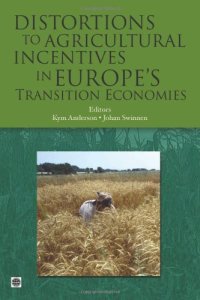
Ebook: Distortions to Agricultural Incentives in Europe's Transition Economies (Trade and Development) (Trade and Development)
Author: Kym Anderson Johan Swinnen
The vast majority of the world s poorest households depend on farming for their livelihood. During the 1960s and 1970s, most developing countries imposed pro-urban and anti-agricultural policies, while many high-income countries restricted agricultural imports and subsidized their farmers. Both sets of policies inhibited economic growth and poverty alleviation in developing countries. While progress has been made over the past two decades to reduce those policy biases, many trade- and welfare-reducing price distortions remain between agriculture and other sectors as well as within the agricultural sector of both rich and poor countries. It is more than 15 years since the first comprehensive empirical studies of the disarray in world agricultural markets appeared. This volume is the first in a series (other volumes cover Africa, Asia, and Latin America) that not only fill that lacuna for recent years but extend the estimates in a consistent and comparable way back in time and provide analytical narratives for scores of countries aimed at shedding light on the evolving nature and extent of policy interventions over the past half-century. Distortions to Agricultural Incentives in Europe s Transition Economies provides an overview of the evolution of distortions to agricultural incentives caused by price and trade policies in the economies of Eastern Europe and Central Asia, which are transitioning away from central planning. The book includes country and sub-regional studies of the ten transition economies of Central and Eastern Europe that joined the European Union in 2004 or 2007, of seven other large member countries of the Commonwealth of Independent States, and of Turkey. Together these countries comprise over 90 percent of the ECA region s population and GDP. Sectoral trade and exchange rate policies in the region have changed greatly since the dissolving of the Soviet Union in 1991, but price distortions in this region remain and must be reduced. The new empirical indicators in these country studies provide a strong evidence-based foundation for evaluating policy options in the years ahead.
Download the book Distortions to Agricultural Incentives in Europe's Transition Economies (Trade and Development) (Trade and Development) for free or read online
Continue reading on any device:

Last viewed books
Related books
{related-news}
Comments (0)